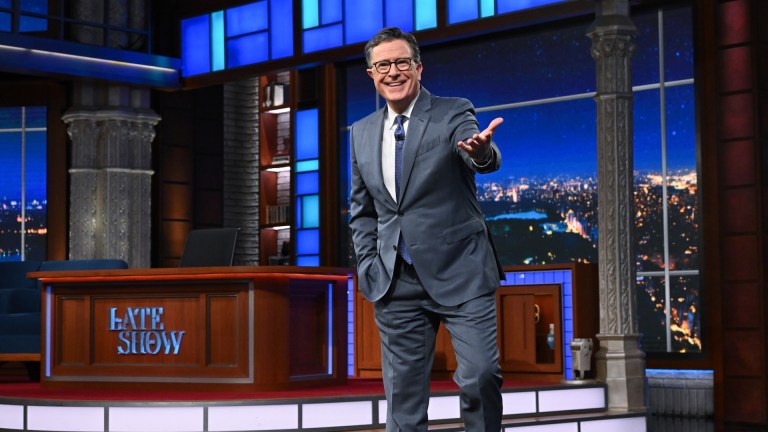Does Stephen Colbert’s Exit Doom Late Night As a Genre?
Paramount's controversial Late Show decision is the latest evidence of the talk show format's decline.

The Late Show with Stephen Colbert was unceremoniously cancelled last week in a move that shocked fans of the late night talk show genre … and garnered more than a few eyebrow raises from the politically engaged.
First hosted by David Letterman, The Late Show has aired for three decades on CBS, a network that is part of Paramount Global, which is on the verge of merging with David Ellison-owned conglomerate Skydance Media. Such a transaction requires regulatory approval to be completed from the FCC, which is run by President Trump appointee Brendan Carr. Trump has been engaged in a legal dispute with CBS, having reached a $16 million settlement earlier this month. Constant jokes at the expense of Trump from Colbert throughout his monologues (including calling the CBS settlement a “big, fat bribe”) don’t exactly cater to the emotionally sensitive world leader’s ego.
All of this is to say that the timing of The Late Show’s cancellation raised many questions. Was Colbert taken down to appease the president’s ego and grease the wheels for a Paramount/Skydance merger? Or is the end of the show really just a financial decision, as Paramount press statements have claimed?
Either way, The Late Show’s demise speaks to the grander scheme of late night entertainment’s format validity going forward. If Colbert was cancelled for being Colbert, then wouldn’t CBS have kept The Late Show franchise and found a new replacement host in May 2026? Saying good riddance to the entire program, one that has been at the top of its class in the Nielsen ratings for nine straight years over competitors Jimmy Kimmel Live! and The Tonight Show Starring Jimmy Fallon, spells doom for one of TV’s oldest institutions.
We’ve seen the handwriting on the wall for quite a few years now. Colbert’s show isn’t the first casualty in the late night extinction era. Conan O’Brien left the genre when TBS cancelled his titular talk show. This is ironic considering Conan was mired late night controversy back in 2010 due to the importance of the format. O’Brien’s leash was so short that he famously got pushed out so Jay Leno could return to The Tonight Show. This was back at a time when late-night shows as properties unto themselves were still valuable. Fast forward 15 years, and the programs are being scrapped regardless of who’s in the suit and tie on stage.
James Corden’s run on The Late Late Show ended even after years of him laying out a blueprint for how other hosts could adapt their comedy for the internet era. Corden’s “Carpool Karaoke” skits frequently went viral on YouTube during the late 2010s and early 2020s. Singing with celebrities was a light-hearted, much less topical style of humor than the satirical jazz that Colbert applies. It still wasn’t good enough. The franchise was axed in 2023 by … CBS.
Even if we say that CBS and Paramount are leading the charge to end late night talk shows, it’s clear that other traditional comedy series at the 11:35 p.m. slot are becoming a relic. Networks used to think that replacing older comedians with younger ones would appeal to the coveted age 18-49 advertising demographic. Instead, the average age of Colbert’s audience is eight years older right now than Letterman’s was a decade ago (68 years old versus 60 years old). It appears that late night talk show audiences will continue to grow older no matter who the host is.
The American attention span has been cut so dramatically that even a 30-second TikTok is too much for a lot of us. Doomscrolling culture and needing that hit of dopamine that comes from a new stimulus after only a few waning moments with a person or topic means that a commentator interviewing a subject for 10 minutes or rambling about the day’s events has outlasted its welcome. That’s beyond unfortunate.
Late night talk show hosts become a fixture of their fans’ lives. Watching late night is a routine that becomes just as ingrained as your morning coffee or a shower at the end of a hard day’s work. This is still possible through highlight videos on YouTube, something that even Colbert’s team realized in full. He averaged anywhere between 200,000 to 400,000 views on that platform daily. This number has gone up tenfold since he lost his job on July 16. Unfortunately, the numbers you get for a live audience still seem to take precedence over those you get online.
Repetition is comforting. Some of us don’t need a novel video or a shock-value clip on our phone screens to wind down. Often, that calm comes in Conan letting Sacha Baron Cohen gyrate on his desk or Craig Ferguson bantering with a primitive robot as his sidekick. Watching these hijinks happen in the context of the rest of the show elevates the material. Only seeing a sample of something without the beginning and the end is like LeBron James partisans trying to assess Michael Jordan on a small selection of dunks and dribble moves without ever watching him play a full game.
Each host has a unique sense of humor, but the format no longer allows anyone to break into it. Jimmy Fallon’s show is a caricature of what it used to be. His interviewing skills have always been the weak point of his talk show persona, but The Tonight Show survives (for now) via Fallon’s plethora of musical talents. Most of his skits and games revolve around this, and it appears to be a key component in his keeping The Tonight Show viable. His team has tried to cater to the social media generation and has accomplished this better than anyone.
Reports indicate that Fallon’s videos got 9.2 billion views across all social media platforms in the last 12 months. This is a 55% increase from the previous year. While others are struggling to put the contemporary late night puzzle together, Fallon’s team has come up with creative solutions. Unlike how Corden’s “Carpool Karaoke” videos were often around 15-20 minutes in length, Fallon’s are more in the vein of the two-minute drills that influencers have perfected for the modern attention span. Still, old-school late night fans aren’t necessarily going to find Fallon’s sustainability instincts in line with the lore of Johnny Carson, Leno, and Letterman. Losing the essence of the format to keep it alive is a sacrifice some might find sacrilegious.
No matter what any of these hosts turn to for ideas or to usher in a new era of late night television, that description of the genre may be an oxymoron at this point. Podcasting, TikToking, and streaming have become the triple threat of media and entertainment in the 2020s. Late night TV will have to be held close to the heart for those tinged with nostalgia, wishing they could go back to the corny dad jokes of David Letterman and Jay Leno.
